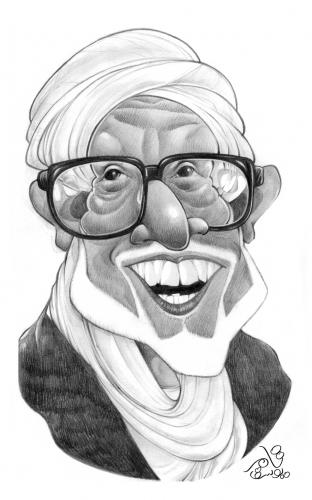Sheikh Hassan Al-Turabi - Sudan
#44236 / viewed 11107 times* Sheikh Hassan Al-Turabi | Sudan | by Tamer Youssef | Pencil Sketch on Bristol Paper | San Francisco | California | USA | May 2006 | Tamer Youssef's Caricature World *
Sheikh Hassan Al-Turabi is undoubtedly one of the most consequential Sudanese thinkers of our times. Born in the eastern Sudanese city of Kassala in 1932, he has held a string of ministerial portfolios under successive Sudanese governments, culminating with his position as speaker of the Sudanese Parliament. A legend in his own time, Turabi, or rather his views, have tended to attract rather more attention with him out of office; they are likely to do so even more this year. Turabi captured the Zeitgest of Sudan and much of Muslim Africa in the early 1990s with his radical Islamist posturing. In 1991, he founded the Popular Arab and Islamic Congress (PAIC), an annual event that grouped together militant Islamist leaders from around the world. As secretary-general of the PAIC, he played host to the likes of Saudi dissident Ossama bin Laden, the leader of Al-Qaeda, who was based in Sudan in 1990-96 -- a time when Turabi was at the pinnacle of his political career. Western-educated, fluent in both French and English, Turabi sees himself as a man with a mission. He earned his Masters at the University of London (1955-57) and PhD from the Sorbonne, Paris (1959-64). He married into perhaps the most important religious-political family in Sudan -- his wife Wisal is the sister of former Sudanese Prime Minister Sadig Al-Mahdi. However, his conjugal connections did not save him when he fell out with his once political ally Sudanese President Omar Hassan Al-Bashir. Hailing from a family steeped in Islamic jurisprudence, his father being a judge, Turabi has always prioritised Islam over racial, ethnic and tribal identity. Early on in his career and immediately after his graduation from Khartoum University, Faculty of Law, in 1973, Turabi joined the Islamic Charter Front (ICF), the Sudanese branch of the Muslim Brotherhood. Rising quickly in the ranks, the suave and articulate Turabi became the secretary-general of the ICF in 1964. From the inception of his political career, he stressed the liberal, progressive and open-minded nature of Islam. He championed women's rights -- authoring The Position of Women in Islam in 1973, a radical treatise in Islamist discourse at the time.
sheikhhassanalturabisudanpoliticsreligioncatooncaricatureportraitpencilartsketchbytameryoussefegypt




Σχόλια (1)
Member
Nayer, on April 27, 2009 report post απάντηση applause 0